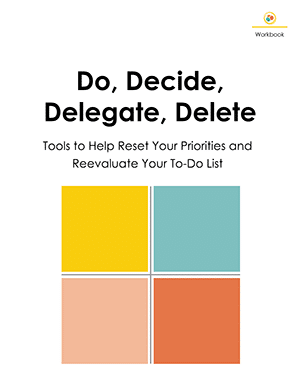Maintaining our relationship with our families is fundamental to our current and future well-being. Our children and our spouses/partners deserve our attention more than anything else. And yet, the constant need for attention from work, family, society, not to mention personal expectations, weighs heavily on our shoulders leaving us unable to set priorities in any reasonable way.
Stress and anxiety tend to cloud our judgment, making everything feel desperately important and urgent. That way of thinking is neither true nor sustainable.
When your relationships are strong and your family supported, they are able to succeed in innumerable ways because they have a parent or partner that cares what happens to them and how they feel. And most likely, that same parent or partner would move mountains to make things possible.
In turn, they are more likely to extend the same support to you, and that makes everyone’s life a whole lot better.
“Once you give yourself permission to stop trying to do it all, to stop saying yes to everyone, you can make your highest contribution towards the things that really matter.”
– Greg McKeown
Change Your Mindset to Set Priorities
The amount of time we have each day never changes. And there is no way to add more time to our day, unless we create it. But how? To create more time as a family we have to set priorities.
That process can be hard for many of us. To support our families and succeed in our own endeavors, we need to change our mindset from believing that everything is urgent and critical to focusing on what is actually important and necessary in our lives.
Of course, we also need to make sure the urgent things get done, but we don’t necessarily need to do them ourselves. More on that to come.
Next, Confirm Your Values as a Family
Before you can start to set priorities, though, and decide which of your tasks are important, you need to know what your values are. By knowing what you value, you have a clearer picture of what is truly important to you. And when you decide on your values with your family, together you create a more cohesive family team.
That close family team comes in handy when you are trying to complete an important task and your kids want you to do something else. You can refer back to those values and the time you spent together confirming them.
Kids are much more likely to allow you the time you need when they know you are working toward something they’ve already bought into.
If you aren’t sure what your family values are, download our resource guides:
Strategies to Set Priorities
Once your values are in place, you can begin to set priorities. Here are some strategies that work for me:
1. Use the Eisenhower Matrix
As Dwight D. Eisenhower, 34th president of the United States said, “I have two kinds of problems, the urgent and the important. The urgent are not important, and the important are never urgent.”
While there are some exceptions to this, especially when you hear one of your kids scream (both urgent and important), our video and resource guide “Do, Decide, Delegate, and Delete” based on using the Eisenhower Matrix provides examples that can help you set your priorities in order to take back your time.
Workbook
Do, Decide, Delegate Delete
Tools to Help Reset Your Priorities, Reevaluate Your To-Do List, and Make More Time for Family
2. Utilize Time Blocking
Time blocking changes your thought process, from allocating time to specific tasks, to allocating larger blocks of time to groups of tasks. It’s a process that takes a bit getting used to but is really valuable in helping you focus on the important things.
For example, email and social media. Rarely is email and social media urgent. Turn off the alerts for all but the most important messages or emails. Then allocate two times a day to work email, instead of constantly checking every time you receive a new message. Whether at home or at work, it will make a big difference.
One of our course students, a museum director and mother, shared a story about when her teenage daughter walked into her room and sat down on the bed next to her. The mother was busy on her phone and so focused that she didn’t see her daughter come in. After 10 minutes, her daughter finally nudged her to get her attention.
Previously this student/mother had wondered why her daughter was always so focused on her phone and didn’t have time for mother/daughter discussions. This story makes the daughter’s behavior clear.
First, the mother was modeling the behavior she didn’t want her daughter to have. Second, the mother was focused on the “urgent” phone and not her “important” daughter.” Needless to say, the mother changed her behavior. This story is a powerful example of urgent vs. important. Use time blocking to make sure your phone is a tool and stop the FOMO insanity!
3. Teach Children Time Management Skills
This foundation was a key element in helping my children learn how to measure time. While you’re not trying to teach your children to live by the clock, this simple approach to learning how to tell time helps them understand the relationship between minutes and hours.
As they got older we were able to talk about the fact that there are only 24 hours in a day. To do all the things we want to do, we have to manage our time and set priorities. Unsurprisingly, as they learned to manage their time, they learned the value of time—theirs, mine, and ours together as a family.
The additional resource section of our guide Do, Decide, Delegate, Delete has a lot more to share on the topic.
4. Do Things Right the First Time or Waste Precious Time Doing Them Again
While attending officer candidate school for the US Marine Corps, I learned the importance of doing it as you go and doing it right the first time. Our drill instructor had a game called inside/outside. It was a simple game.
If our space was not the way it was supposed to be in terms of things being in the right place, and ready for inspection, then we had to take everything we were responsible for, including the mattress and footlocker, outside the building. Once outside, we had five minutes to put it back in the barracks and get it ready for inspection. Unfortunately, we played that game more often than we wanted.
When my youngest son was in Boy Scouts, we camped with the troop a lot. As an assistant Scoutmaster, I noticed that the camp cabin my son and some of his fellow Scouts were using was not being well kept. After a couple days, things had not improved, so we played inside/outside.
The Scouts got the message and kept their cabin clean for the rest of the trip. What was amazing is that once we got home, my son kept his room clean and tidy. His camp experience was a great lesson in time management for many aspects of his life.
This same lesson of doing things right the first time applies to buying quality products instead of cheaply made garbage. You may save money buying something inexpensive but when it inevitably falls apart you’ll have to spend more money and more time buying another one.
Think about all the things there are to buy for school (backpacks, lunch boxes, clothes, etc.). It certainly adds up. But when the backpack gets a hole in it and the snap closure on the lunch box breaks and the clothes look threadbare after a few washes, you end up having to replace everything. Was the initial bargain really worth it?
5. Enlist the Family to Help
Remember how I said we don’t necessarily need to do the urgent items ourselves? When you delegate items, they are removed from your list. Your children want and need to learn how to do things for themselves. When you delegate items to them, it’s a win-win situation. You also create more time that can be spent enjoying life as a family.
There are countless examples in our Raising Families resource guides on how you can do this. Teach your children about meal planning and preparation so that they can take on these often time-consuming responsibilities at home. In doing so, they learn skills and you can focus on what’s important to ensure the success of your family.
Even though the amount of time we have each day has not changed, you now have the knowledge and tools to set priorities so you can take back your time.
What To Do Next
1. Read more in the blog:
The Family Wisdom Blog shares valuable ideas across diverse topics.
2. Explore the Printables Library:
Our printables library is filled with must-have activity ideas, checklists, guides, and workbooks.
3. Subscribe to Our Newsletter:
Sign up for our newsletter for parenting tips to help you create the family team you've always wanted.
Rick Stephens
Rick Stephens is a co-founder of Raising Families. With 33 years of experience as a top-level executive at The Boeing Company and having raised four children of his own, he is able to support parents and grandparents by incorporating his knowledge of business, leadership, and complex systems into the family setting.
In his free time Rick enjoys road biking, scuba diving, visiting his grandkids, and generally trying to figure out which time zone he’s in this week. Read full bio >>




